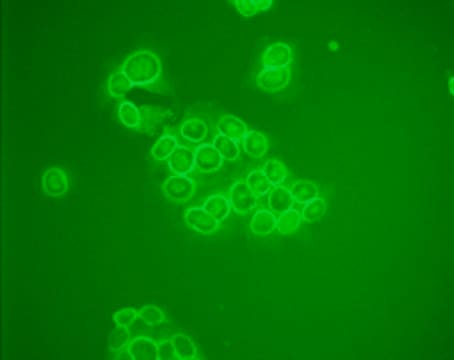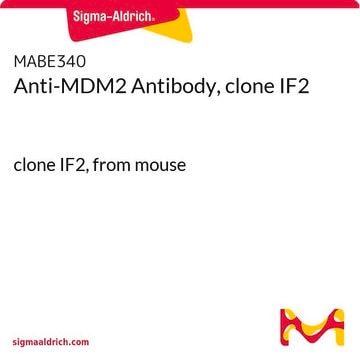M7815
Anti-MDM2 antibody ,Mouse monoclonal
clone HDM2-323, purified from hybridoma cell culture
Sinonimo/i:
Anti-ACTFS, Anti-HDMX, Anti-LSKB, Anti-hdm2
About This Item
Prodotti consigliati
Origine biologica
mouse
Coniugato
unconjugated
Forma dell’anticorpo
purified from hybridoma cell culture
Tipo di anticorpo
primary antibodies
Clone
HDM2-323, monoclonal
Forma fisica
buffered aqueous solution
PM
antigen ~90 kDa
Reattività contro le specie
human, mouse
Concentrazione
~2 mg/mL
tecniche
indirect ELISA: suitable
microarray: suitable
western blot: 1-2 μg/mL (whole cell extract of 293T cells transfected with human MDM2)
Isotipo
IgG2a
N° accesso UniProt
Condizioni di spedizione
dry ice
Temperatura di conservazione
−20°C
modifica post-traduzionali bersaglio
unmodified
Informazioni sul gene
human ... MDM2(4193)
mouse ... Mdm2(17246)
Descrizione generale
Immunogeno
Applicazioni
Azioni biochim/fisiol
Stato fisico
Esclusione di responsabilità
Not finding the right product?
Try our Motore di ricerca dei prodotti.
Raccomandato
Codice della classe di stoccaggio
10 - Combustible liquids
Classe di pericolosità dell'acqua (WGK)
WGK 3
Punto d’infiammabilità (°F)
Not applicable
Punto d’infiammabilità (°C)
Not applicable
Certificati d'analisi (COA)
Cerca il Certificati d'analisi (COA) digitando il numero di lotto/batch corrispondente. I numeri di lotto o di batch sono stampati sull'etichetta dei prodotti dopo la parola ‘Lotto’ o ‘Batch’.
Possiedi già questo prodotto?
I documenti relativi ai prodotti acquistati recentemente sono disponibili nell’Archivio dei documenti.
Il team dei nostri ricercatori vanta grande esperienza in tutte le aree della ricerca quali Life Science, scienza dei materiali, sintesi chimica, cromatografia, discipline analitiche, ecc..
Contatta l'Assistenza Tecnica.







